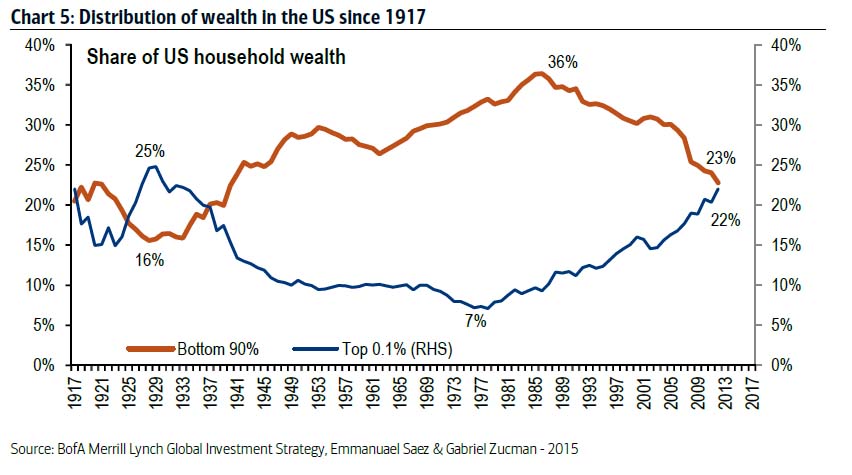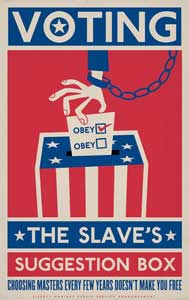In this essay I will discuss the philosophy of Voluntaryism. In Section 1, I will explain the basic principles of this philosophy, then in Section 2, I will discuss some of the more controversial logical conclusions of the philosophy. In Section 3, I will provide some responses to common objections that people raise to Voluntaryism, and I will wrap it all up in Section 4 with some general comments on the future of Voluntaryism.
1. What is Voluntaryism?
Conceptually, Voluntaryism is a very simple moral philosophy – it is the basic proposition that all human interaction should be directly consensual. Voluntaryism rejects the initiation of force in all its various forms including physical violence, threats of violence, theft, bullying, slavery, rape, murder, etc. However, unlike Pacifism, Voluntaryism does not bar the victim of coercion from responding in a strictly self-defensive manner. And voluntaryism completely rejects any attempts to construe offense as defense, such as the phrase “the best defense is a good offence”. Finally (and this barely needs mentioning, but for the sake of providing a complete definition I will include it) voluntaryism does not discriminate on race, gender, age, sexual orientation or physical or mental ability.
Hopefully, up to this point readers will not think that anything remarkable has been said. The above definitions really should sound less like a novel philosophy and more like “how I already live and experience my life”. Indeed 90% of human interactions are already conducted in the voluntary manner described above. In the next section I will discuss the remaining 10% of interactions which contradict the voluntary philosophy. (note that 90% and 10% are just numbers I made up to signify “most” and “a small amount” respectively).
2. Some Controversial Conclusions of Voluntaryism

Based on the above definitions, most people would agree that voluntaryism is a moral philosophy worth upholding. However, in my experience almost all these people will alter their stance and completely reject Voluntaryism when they discover what the logical conclusions of Voluntaryism entail. Here I will list and briefly discuss some of the logical conclusions which people typically find controversial:
Voluntaryism rejects trade restrictions
such as prohibition of substances or weapons.
The uncoerced passage of goods between seller and buyer is one of the most important consequences of the Voluntaryist philosophy. For the exchange to be voluntary, both parties must be free to set their own terms for the exchange. The seller must be free to charge any price and the buyer must be free to request any price. Both parties must be free to reject the other party’s price and indeed the whole trade if desired. Obviously theft is the polar opposite of this voluntary arrangement and therefore is completely rejected under Voluntaryism.
If the seller fears that the buyer may use the exchanged goods for a purpose which he (the seller) does not personally agree with then, according to the Voluntaryist philosophy, the seller is completely justified in refusing to trade. For example, the seller might fear that the buyer would use the weapons he sells to attack innocent people, in which case he would be free to boycott the deal. Likewise, someone may buy a house then discover that there are marijuana plants growing in the garden. If this person does not approve of the use of marijuana then, according to the voluntaryist philosophy, there is no requirement to sell the plants even if doing so would be profitable.
Voluntaryism supports the acquisition of any weapon for defensive purposes, and denies the legitimacy of a third party to interfere in a trade of such goods. Ownership and use of drugs (e.g. alcohol, caffeine, tobacco, heroin) are unrelated to coercion and is therefore fully permissible under the Voluntaryist philosophy. Therefore Voluntaryism does not permit a third party to interfere against the wishes of the buyer and seller in drug trades.

Voluntaryism rejects taxation
regardless of the purpose of the tax.
Taxes are a form of involuntary exchange, and are synonymous with theft. Without the initiation of force, taxes would cease to exist. Taxes are not subject to voluntary negotiation between buyer and seller, but rather they consist of a third party forcefully intervening in a transaction to extract an arbitrary amount.
As this is one of the hardest concepts for newcomers to Voluntaryism to understand, I will devote a large portion of the Section 3 to responding to common objections to the claim that “taxation is theft”.
Voluntaryism rejects both non-defensive wars and mandatory conscription for any war.

As was briefly mentioned in the first (definitions) section, Voluntaryism can be distinguished from pacifism in that Voluntaryism permits self-defense while Pacifism does not. Therefore the Voluntaryist response to a threat of invasion is to fend off the attackers, using deadly force only as a last resort; whereas the pacifist response would be to stand by and observe (or be killed) as the attackers invade.
However, initiating an attack, regardless of the intended purpose of that attack, runs directly against the Voluntaryist philosophy. For example, if there is a strong suspicion that a neighboring regime is amassing for an attack, the Voluntaryist response would not be to preemptively attack the regime, but rather to ensure that all grievances are dealt with and restitution made for any wrongs. If the regime is unreasonable and still wishes to invade, then the Voluntaryist course of action might be to strengthen the defenses. It would probably also be wise to inform the regime that these defenses are not for the purpose of launching an attack, so as to minimize the chances of an arms race.
One other important issue relating to voluntary self-defense on a large scale is the procurement of mercenaries. According to Voluntaryism, mandatory conscription must be rejected as this involves forcing someone to do something (fight) against their own will. Rather, Voluntaryism requires that mercenaries freely choose to conduct any defensive activities. And of course those who wish for the mercenaries to defend them are free to provide incentives (e.g. money, land, etc.) in exchange.
In Section 3 I will respond to the objection that these mercenaries would turn on those whom they have agreed to defend.

Voluntaryism = Anarchy
As you will probably have noticed from the above conclusions, the main opponent of Voluntaryism is government. This may come as a shock to those who considered the definition of Voluntaryism given in the first section to be a good definition of morality. If voluntaryism is synonymous with morality then the opposite of Voluntaryism must also be the opposite of morality, which makes government inherently immoral.
This is not to say that all the things that government does are necessarily immoral, but rather that the manner in which these things are done is immoral. For example, providing welfare for the disabled would seem to be a very moral activity and this is indeed something which governments do. However, the manner by which the welfare money is obtained to give to the disabled is of vital importance. Governments obtain their money either through taxation or legal tender laws and the printing of money (inflation), both of which require the initiation of force, so the only moral action to take with this money is to return it to its victims. In Section 3 I will refute the objection that the poor and disabled would go without welfare in a voluntary society.
It also bears mentioning here that anarchy can mean different things to different people. Some people associate anarchy with chaos – indeed this is a typical usage of the word, while others associate anarchy with a lack of private property (communism). However, when I say anarchy in this essay I simply mean “no government”. This does not mean “no rules”, but rather “no involuntary rulers”. Voluntaryism of course permits people to voluntarily subjugate themselves to rulers (for example, a personal trainer is a form of ruler, and so can be an employer), however it is the rulers who have not been appointed in a directly consensual manner who are illegitimate under Voluntaryism.
By this stage you may be feeling fairly shocked. My guess is that you had never considered things such as drug prohibition, taxation, or mandatory conscription to be immoral and, unless you are in a tiny minority, I am fairly certain that you have never considered anarchy to be moral. The sad fact is that the most powerful people in the world in which we live write laws which directly contravene the Voluntaryist philosophy. However, Voluntaryism is somewhat vindicated by the fact that the average person interacting with their friends, or buying things at the shops or just going about their everyday lives is already acting according to the Voluntaryist philosophy.
3. Responses to Common Objections to Voluntaryism
I will start this section with a brief discussion on a couple of the positive aspects of human nature – namely human compassion for others who are less fortunate than ourselves, and the human tendency to work to improve our own lives both via individual creativity and via cooperation with others. I will be referring back to these points as I respond to some common objections to Voluntaryism later on in this section.
Just as almost all humans have two legs and two arms, so almost all humans feel compassion for each other. Researchers at Princeton university have found that the human brain seems wired up to respond to others’ suffering [1]. They found that helping others triggers activity in the caudate nucleus and anterior cingulate, portions of the brain that turn on when people receive rewards or experience pleasure. This is a rather remarkable finding – helping others brings the same pleasure we get from the gratification of personal desire. While it may be rare for someone to devote their entire life solely to helping others, it is not rare for a large number of people to devote a much smaller amount of effort to helping their fellow man. 1000 people donating their time and effort for merely an hour each week have a far greater effect than a single mother Teresa diligently devoting every hour of her life to the same cause.
Another positive aspect of human nature is the human tendency to work to improve one’s own life. In its most basic (microeconomic) form this trait is essential for human survival. Examples include working to feed oneself, clothe oneself, and shelter oneself from harsh environments. The more complex (macroeconomic) form of this trait is responsible for all the economic progress we enjoy in our modern high-tech world. Examples include the development of the a combine harvester which enables a single farmer to do the same amount of work previously requiring thousands of people, the development of medical equipment and techniques which have helped extend the human lifespan from less than 30 years to over 75 years, and supersonic air travel which can transport people from one side of the globe to the other in under a day (to name a small fraction of human accomplishments!). All of these accomplishments are due to individual and collaborative human creativity. It also bears mentioning that coercion has never been necessary for the development of inventions. People do not need a gun to their head to develop innovative things – they will do so both because they find it fulfilling and because the rewards are great.
With these human traits in mind I will now answer some of the most common objections to the Voluntaryist philosophy:

Without taxation the poor and disabled would starve to death
The first thing to note here is that the objection does not dispute the fact that “taxation is theft”. Rather, it focuses on the consequences of eliminating tax. In other words, this objection presupposes that the initiation of force (theft in this case) is justifiable so long as the ends are sufficiently worthy. This notion is actually part of another common philosophy known as consequentialism. Voluntaryism on the other hand comes under the deontological ethics category of philosophy. Entire books have been devoted to debating the relative merits of these two philosophies, so obviously I will not go to such a deep level here. However I will counter this particular claim by simply altering the ends in question.
Consider the following scenario – there is a need to provide clean water, clothing, medical equipment, etc. to the world’s poorest people many of whom are currently living hand-to-mouth in Africa. I will proceed under the assumption that the person raising the objection agrees that providing these ends is a very worthy goal. Therefore I might propose to the objector the following means to achieve this goal: “tomorrow I will begin stealing cars, starting with yours, and I will then be selling them to donate the proceeds to the starving African people”. My guess is that the objector would be outraged at this idea. So I might continue, “but don’t you care about those who are starving in Africa?”. And I would expect that the objector to respond, “of course I do, but this worthy cause does not warrant your stealing my property. I’d be prepared to donate voluntarily to an African charity, but you can’t just take my things to finance your operation!”
Hopefully this scenario demonstrates that stealing someone’s property is immoral, even for the noble motive of helping the poor and disabled. As I discussed at the start of this section, people are naturally compassionate, and when faced with others who are down on their luck they are naturally willing to lend a hand or give money or goods to help out.
Finally, I must add that 100% of people who raise objections to Voluntaryism will give this as one of their main objections, which I take as further proof that people are very interested in the well-being of the poor and disabled. my expectation would be that if government compulsion were removed from the equation then there would still be a widespread desire to ensure that the poor and disabled are well taken care of. Furthermore, in the absence of tax and inflation, vast additional resources would become available for this purpose.
Without taxation there would be no roads, public hospitals, police, etc.

This is another very common objection to Voluntaryism, and as with the previous objection, it does not dispute the fact that “taxation is theft”, but rather focuses on the consequences of eliminating tax. The underlying theme of this question is that without taxation the average person would not be able to afford basic necessities which are currently paid for with taxation. Some people will also point to the USA when stating this objection and say that when healthcare is not run by government then it costs people a lot more.
The stated objection is actually derived from another political philosophy which is very popular in western democracies today – state socialism [2]. This becomes clearer when the objection is rephrased in a broader manner: it is acceptable to act in an immoral manner because doing so will result in cheaper goods or services.
There are two responses to this objection and I will give both. The first is that voluntaryism is a moral philosophy and so it is not directly concerned with economic efficiency. An example from history will serve well here. During the late 1700s in the USA, all cotton was grown and harvested by African-American slaves. The main fear of the day was that if slavery were abolished then cotton farmers’ profits would be lower as they would have to pay workers to do the work voluntarily. The voluntaryist response to this dilemma (which hopefully the objector will agree with) is that no amount of profit justifies enslaving someone. Likewise with roads, public hospitals and police – no amount of cost reductions for some can justify stealing from others. If roads, hospitals and services which protect people can be provided via voluntary exchange (and I will explain in the next paragraph that they can), then this is completely in line with voluntaryism. But voluntaryism opposes these things both being funded by stolen money and being forcibly monopolized.
The previous paragraph may leave some readers feeling apprehensive that a voluntaryist society would be a very expensive one to live in. This leads to the second response to the objection – government involvement is inherently expensive, and in fact societies in which all human interactions are directly consensual (i.e. a society of voluntary exchange) are the most economically efficient societies currently known to mankind. I won’t delve too deeply into the topic of economics as it is large enough to fill many libraries, but suffice to say that:
- coercive monopolies have the least incentive to lower prices as they face the least economic competition [3]
- once laws are passed by governments it is close to impossible to repeal them, even if they are generally agreed to be inefficient and unnecessary [4]
- government regulation of otherwise voluntary activities can reduce economic efficiency to the point where the market becomes just as inefficient as the government administering the regulations [5]
This final point is the case for almost the entire American healthcare system, which people mistakenly cite as a model of voluntary exchange. An alternative healthcare system built on Voluntaryist principles would be the mutual-aid model which existed prior to the takeover of the healthcare market by government at the start of the twentieth century [6].
So to summarize, far from there being no roads, hospitals, and protective services in the absence of taxation, these services would actually be provided in an ethical manner and at much lower prices.
Without government warlords would take over.

This objection comes up quite often. The first thing to note is the use of the word warlord to imply a coercive entity who is both legally and morally exempt. However, as discussed in Section 2, government is already the one coercive institution in almost all countries to be both legally and morally unaccountable. Governments write their own laws which govern their code of conduct, so if they wish to do something previously classified as illegal they can simply enact it into law. So the question really should be rephrased to, “without a single morally exempt entity, other morally exempt entities might spring up”. When put like this, the objection sounds rather strange. If the aim is to eliminate morally exempt entities then surely the first step should be to eliminate the existing one.
I suspect that when people raise this objection what they really mean is, “what if, in a society run on voluntary principles, warlords were to enslave the entire population in a military style dictatorship?”. The simple answer to this is that people in a voluntary society should always be prepared for such attempts and should set up mechanisms whereby this is not possible. I obviously can’t predict the mechanisms that people may choose but here are some ideas:
- a mobile phone app that alerts a large number of people to an invasion so that defense can be as speedy as possible (penalties for false alarms would also be recommended)
- delegation of defensive responsibility to a number of security providers, each of which is kept in check by a large bond to be forfeited if their Voluntaryist code of conduct is breached [7]
- internet and TV media to investigate any entities capable of amassing an army, and to report on any who are unwilling to be completely transparent
Of course there are an infinite number of possible ways which the problem of security could be solved. In the absence of government, it would be in every person’s immediate interest to seek out flaws in the security provision system and fix them. As mentioned at the start of Section 3 people are very creative when faced with challenges, and when large groups of people put their mind to a task they can be completely unstoppable. Viewed in this light, the protection offered by government defense forces no longer seems like the firewall it is commonly thought to be.
Without government the rich would take over and essentially run the country

As with the objection to voluntaryism on the grounds of warlords taking over, this objection already contains a loaded assumption. In this case the assumption is that so far the rich have not taken over and are not running the country. The reality though is that it is hard to find a country where this objection is not already the case. The average net worth of politicians is well in the millions and often in the billions of dollars in western democracies [8]. And likewise the consultants and business connections who influence these politicians are exceedingly wealthy (and in many cases are ex-politicians themselves) [9].
Voluntaryism has no objections to wealth, so long as it is earned through voluntary exchange. In fact wealth earned in this manner is a reward for providing a large number of people with the goods or services they desired. However wealth earned through legal privilege or by secretly granting political favors to business friends in exchange for a kickback is about as far from voluntary exchange as it gets.
The elimination of government, far from being beneficial to the rich, would actually close off a large source of their funding. Without the legal ability to tax or regulate money away from people, or even to print it for themselves [10] the rich would need to produce something of value to sell to willing customers.

Democratic government is already voluntary. We all agreed to be governed when we voted.
While it may be true that casting one’s own vote signifies one’s willingness to be governed, it is certainly not true that this action signifies anybody else’s willingness to be governed. If voting is synonymous with consent then those who do not vote have not given their consent, and this consent certainly cannot be given on that person’s behalf. This fact is not altered by the ratio of voters to non-voters. Needless to say, voluntaryists refuse to vote.
If you don’t like it here you can always leave.
As with many of the previous objections, this objection contains a hidden agenda. This is best seen by rephrasing the objection: “the system may well be immoral, but people like it this way. If you were to leave and stop bringing this issue up then we could all go back to pretending that things are fine”.

As already discussed in Section 1, 90% of our lives in today’s western democracies are already conducted according to the Voluntaryist philosophy. The remaining 10% involves people’s interactions with government. Personally I find government to be an annoyance, however not to such a point that it is unbearable. If the government’s intrusion increased to a point where it did become unbearable I imagine I would seek out a new country which was more in line with voluntaryism (if one existed, if not then staying would still be the best option). However, until that happens I would prefer to attempt to open people’s minds to voluntaryism in the hope of bringing about a paradigm shift.
4. Conclusion
Now you have a fair understanding of Voluntaryism. No doubt you can think of a large number of further objections to this philosophy, maybe I will write more essays rebutting other objections. But in the meantime, rather than thinking, “Voluntaryism is indeed a moral and admirable idea, but it would never work in practice,” ask yourself why it would never work, and go one step further and think “could it be made to work if enough people wanted it to?”. Also consider whether Voluntaryism runs in line with or against human nature, and consider whether the deviations from Voluntaryism in our current world (mainly government and criminals) run in line with or against human nature. Every general objection that can be raised to Voluntaryism has been a problem at one stage of history or another, and has been solved in a voluntary manner previously. I think we have every reason to aim for such high standards again.
Finally, a quick discussion on the goals of Voluntaryism. Clearly the aim of this essay has been to try and convince the reader to join the Voluntaryist cause. But what is the Voluntaryist cause? Well really it is quite simple – firstly to educate as many people as possible regarding the nature of morality. This is something that is not taught in schools, so, much as people in the 1300s took it for granted that the sun revolved around the earth, people today take it for granted that governments are capable of acting in a moral manner. If this educational enlightenment can be achieved then my guess is that the desire to eliminate forceful programs and (where applicable) replace these with voluntary alternatives will follow naturally from there.
If you agree with the Voluntaryist definition of morality I have given in the first section and if you can see how the consequences given in the second section are derived from the original definitions, and if you agree with the rebuttals in the third section then I have probably taught you all you need to know to begin your own journey of discovery. Here are some more resources for further investigation:
https://www.youtube.com/user/LarkenRose – Larken Rose has some very good videos challenging common perceptions of government. In particular check out “If You Were King” and “The Jones Plantation”.
https://www.youtube.com/user/stefbot – Stephan Molyneux hosts a radio show discussing every aspect of the life of a Voluntaryist. For starters check out “The Story of Your Enslavement” and “The Bomb in the Brain”. A side note here – Stefan may not be the most consistent advocate of the Non-Aggression Principle, so remember to always critically analyze everything he says. I personally have found that I disagree with him on a number of things. Nevertheless, 90% of the time he is spot on and very instructive..
https://www.youtube.com/user/StormCloudsGathering – Storm Clouds Gathering is a news channel which gives updates on current events in a voluntaryist perspective. “The Psychology of Authority” is an excellent one.
https://www.youtube.com/user/AnCapChase – Chase Rachels gives some really good lectures on practical Voluntaryist alternatives to currently state monopolized industries, such as the roads, welfare, etc.
Mises.org – if you prefer reading to watching videos, the Ludwig von Mises institute publishes many articles which discuss the economics of voluntary vs. involuntary exchange. They have a daily mailing list which is always well researched and very topical.
NotBeingGoverned.com – finally another one for those who prefer reading. This blog has many excellent articles on voluntaryism and economics. Check out the “Anarchy – Never Been Tried?” articles for historical examples with aspects of voluntary societies.
